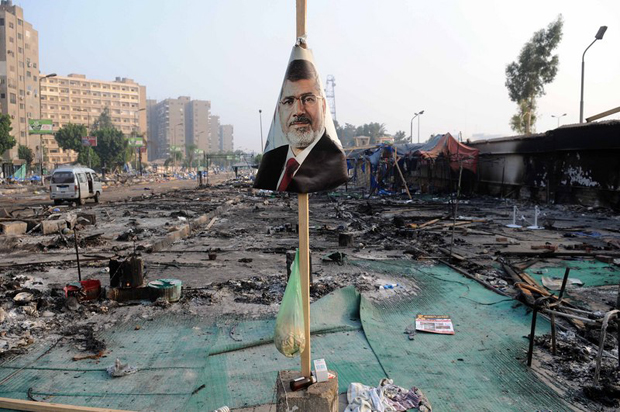
Egypt faced a new phase of uncertainty after the bloodiest day since its Arab Spring began, with nearly 300 people reported killed and thousands injured as police smashed two protest camps of supporters of the deposed Islamist president. (Photo: Nameer Galal / Demotix)
In a widening crackdown on dissent in Egypt since the military takeover on July 3, the Public Prosecutor’s office has reportedly been looking into legal complaints against thirty five rights activists and public figures for allegedly “receiving foreign funding”.
State sponsored Al Ahram newspaper said on its website on Saturday that private citizens had filed lawsuits against the defendants, accusing them of “accepting money from foreign countries including the United States”. According to the Al Ahram story, diplomatic cables leaked by the whistle blower website Wikileaks support the claims.
A judicial source had originally confirmed the story but the prosecutor’s office denied it the following day, calling on journalists to be “more careful and accurate in their reporting”. The defendants meanwhile, believe the ‘mistake’ was deliberate, insisting it was meant to intimidate them and to send a warning message to pro-democracy activists in Egypt to tone down their criticism of the military.
Prosecuting dissenters was common practice under deposed president Hosni Mubarak with regime loyalists often fabricating charges against opponents to silence them. The practice continued under toppled president Mohamed Morsi with his Islamist supporters frequently filing lawsuits against Muslim Brotherhood opponents to intimidate them.
The Al Ahram story triggered an uproar on social media networks Facebook and Twitter, with many internet activists expressing fears that following the brutal security crackdown on Morsi’s Islamist supporters, democracy activists who took part in the January 2011 uprising may be next in line.
Liberal politician Amr Hamzawi denied Al Ahram’s allegations as ‘untrue’ on Twitter, adding that “the campaign of fabrication and distortion must immediately stop”.
Gameela Ismail, a prominent member of the Al Dostour or Constitution Party–who was also among those accused–reacted angrily to what she described on Twitter as “fabricated charges” insisting she would in turn file a lawsuit against those who were “deliberately trying to defame her”.
The rumoured complaints have also fuelled fears of a severe security crackdown on civil society similar to the February 2012 crackdown on NGOs when 43 NGO staffers–including 32 foreigners–were indicted after accusations they were working for unlicensed institutions and receiving illegal funding. The notorious ‘foreign funding’ case dragged on for a year and a half, culminating in convictions for the defendants ranging between one and five years in prison and fines of 1000 Egyptian pounds.
Meanwhile, the arrests of a journalist and a rights lawyer last week has raised concerns about increased rights violations under the emergency law (now in place) allowing for the arbitrary arrests and detention of civilians without charge. Haytham Mohamedein, a leftist lawyer and rights activist was arrested near a military checkpoint in Suez on Thursday and accused of “spreading lies about the military and of belonging to a secret organisation that is planning attacks against the military and state institutions”. While Mohamedein was released the following day, it remains unclear whether the charges against him have been dropped.
Sayed Abu Draa, a North Sinai-based journalist with the independent Al Masry el Youm newspaper who was also arrested last week, has been referred to a military tribunal. He is being accused of “spreading false information about the armed forces and taking photographs of military installations”. A day before his detention, he had slammed the military in a Facebook post for what he described as “misleading information” by the army and the media on the ongoing military operations in Sinai.
In a protest rally organized by journalists outside the press syndicate in downtown Cairo on Monday, the demonstrators called for Abu Draa’s immediate release and for an end to what they described as ” attempts by the authorities to muzzle the press’.
“Freedom of journalists is a red line,” the protesters chanted. “No to military trials for civilians.’
In a crackdown on press freedom since the June 30 rebellion that ousted Mohamed Morsi, the new government this month closed down Al Jazeera Mubasher Misr along with three other networks it perceives as being pro-Islamist. The Administrative Court ruling to shut down the channels was based on charges that included “spreading false rumours and inciting violence.” Government officials claim Al Jazeera was broadcasting without a license –a charge the network denies.
While most state and independent media outlets have clearly aligned themselves with the military-backed government with TV presenters and talk show hosts using strong anti-Muslim Brotherhood rhetoric and advising viewers to support the army in its war against “the terrorists”, a few independent voices refuse to bow under intimidation and threats. They denounce what they describe as “the return of the police state” and are taking a firm stand against censorship.
This article was published on 11 Sept 2013 at indexoncensorship.org




